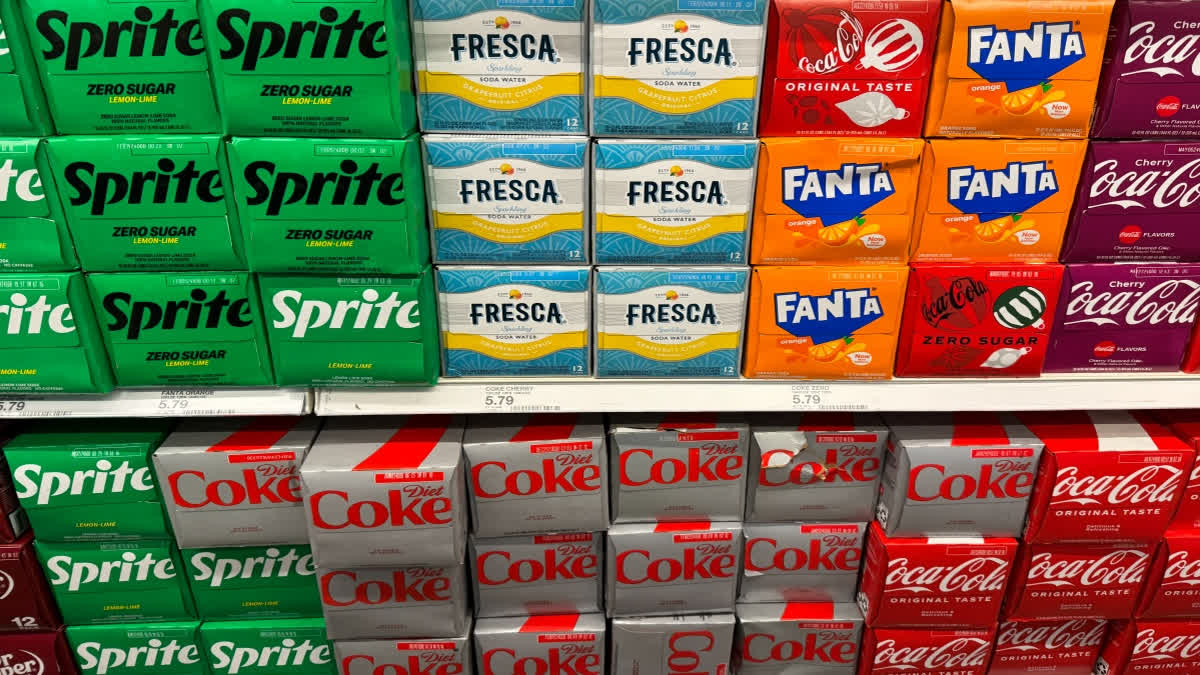New Delhi: Asserting that synthetic soft drinks are not substitutes for water or fresh fruits, a latest guideline over dietary for Indian population conducted by Indian Council of Medical Research (ICMR) and National Institute of Nutrition (NIN) has revealed that carbonated beverages contain phosphoric acid and may damage the enamel of teeth, and affect appetite if taken in excessive amounts.
The guidelines further revealed that people, who regularly consume more than two measures (containing 30ml of ethyl alcohol in each measure) are at a higher risk for hypertension and stroke. Alcohol also increases serum triglyceride levels. It further suggested to opt for buttermilk, tender coconut water, lemon water etc., as beverages in hot weather by avoiding synthetic soft drinks like cold drinks, packaged coconut water, mixed fruit and carbonated beverages.
Dr VK Paul, member (Health) NITI Aayog said the dietary habits of Indians have undergone significant changes over the past few decades, leading to an increase in the prevalence of non-communicable disease while some of the problems of undernutrition continue to haunt us. "These guidelines aim to provide evidence-based recommendations to help Indians make informed food choices to maintain good health and prevent malnutrition in all forms,"
added Dr Paul.
Named as Dietary Guidelines For Indians, the ICMR-NIN guidelines said during very hot weather and while undertaking vigorous physical activity, the requirement of water consumption increases as a considerable amount of water is lost through sweat. It said that a normal healthy person needs to drink about eight glasses (approximately two litres) of water including beverages per day.
Tender coconut water:
Tender coconut water is a good hydrating beverage which contains several minerals and provides 15 Kcal/ 100ml. However, in patients prone to hyperkalemia (in kidney and heart diseases), tender coconut water should be avoided.
Use of pasteurised or boiled milk:
Milk is a rich source of several nutrients necessary for growth and development. Milk is a good source of calcium but not iron. All macro and micronutrients present in milk are easily digestible and absorbable. "Since it is likely to get contaminated, use pasteurised or boiled milk to ensure safety," the ICMR-NIN study said.
Avoid soft drinks:
Soft drinks are non-alcoholic beverages either carbonated or non-carbonated, and may contain sugar or artificial sweetening agents, edible acids (malic acid, citric acid or vinegar, etc.), natural or artificial flavors and sometimes fruit juice. Compared to fresh fruit juices, most commercially available fruit juices may contain varying amounts of fruit pulp (as low as 7 per cent). Carbonated beverages contain phosphoric acid and may damage the enamel of teeth, and affect appetite if taken in excessive amounts.
The ICMR-NIN said that synthetic soft drinks are not substitutes for water or fresh fruits and therefore should be avoided. Beverages like buttermilk, lemon water, whole fruit juice (without added sugar) and coconut water are excellent alternatives to synthetic drinks. Consumption of soft drinks or commercially available fruit juices increases one's sugar and salt intake and hence must be avoided.
Fresh fruit juices:
Orange, lemon, grape, mango, pineapple, apple, pomegranate, etc., are generally used in making fruit juices. Fresh fruit juices (without added sugar) provide vitamins (like beta-carotenes and vitamin C) and minerals (potassium, calcium, etc.). However, they cannot be equated to whole fresh fruits which in addition to vitamins and minerals provide dietary fibre and should be preferred to fresh fruit juices from not more than 100 to 150g whole fruits can be consumed occasionally by adults. Sugarcane juice, which is extensively consumed in India, particularly during summer, is high in sugar (13–15g/100ml) and hence its consumption should be minimised.
Tea and coffee:
Tea and coffee contain caffeine, which stimulates the central nervous system and induces physiological dependence. A cup (150ml) of brewed coffee contains 80–120mg of caffeine, instant coffee contains 50–65mg and tea contains 30–65mg of caffeine. Moderation in tea and coffee consumption is advised so that caffeine intake does not exceed the tolerable limits (300mg/day). Tannin is also present in tea and coffee and is known to interfere with iron absorption. Hence, tea and coffee should be avoided for at least one hour before and after meals.
Besides caffeine, tea (green or black) contains theobromine and theophylline, which are known to relax arteries and thereby promote blood circulation. They also contain flavonoids and other antioxidant polyphenols, which may reduce the risk of coronary heart disease and stomach cancer. These benefits can be best obtained if milk is not added to tea and if it is taken in moderation.
Avoid alcoholic beverages
Alcoholic beverages contain ethyl alcohol in varying proportions. Beer contains 2–5 per cent and wine 8–10 per cent of alcohol, while brandy, rum and whisky contain much higher concentrations (30–40 per cent). Alcohol provides higher calories (7 Kcal/g) than carbohydrates and proteins and thus, can contribute to abdominal obesity. Ironically, excessive intake of alcohol is known to suppress appetite and interfere with absorption and metabolism of nutrients, leading to various nutritional deficiencies.
People who regularly consume more than two measures (containing 30ml of ethyl alcohol in each measure) are at a higher risk for hypertension and stroke. Alcohol also increases serum triglyceride levels.
"Alcohol intake has also been shown to increase the risk of cancers of the mouth, larynx, oesophagus, prostate and of the breast in women. Excessive alcohol intake weakens the heart muscle (cardiomyopathy) and also causes fatty liver, damages the liver (cirrhosis), brain and peripheral nerves," the ICMR-NIN said.



